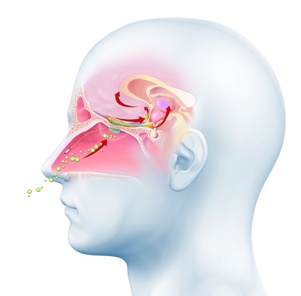 A brain injury can impact your life in ways you never expected. For some people, a brain injury can cause a loss of smell, known as anosmia. Out of the many medical and emotional issues you have to deal with following a traumatic brain injury, anosmia may not be your top concern. However, anosmia is a real health concern that impacts your life and should not be overlooked during your brain injury recovery.
A brain injury can impact your life in ways you never expected. For some people, a brain injury can cause a loss of smell, known as anosmia. Out of the many medical and emotional issues you have to deal with following a traumatic brain injury, anosmia may not be your top concern. However, anosmia is a real health concern that impacts your life and should not be overlooked during your brain injury recovery.
Brain Injuries Cause Anosmia
Most of us experience temporary anosmia from time to time. A head cold, for example, often impacts our ability to smell. However, permanent anosmia has different causes. Parkinson’s disease, Alzheimer’s disease, multiple sclerosis, and old age are some possible causes of anosmia.
Brain injuries can also cause anosmia. Any of the following types of traumatic brain injuries can result in a loss of the sense of smell:
- Skull fractures or facial fractures
- Concussions
- Diffuse axonal injuries
- Injuries to olfactory nerve fibers
Mild, moderate, and severe head injuries can all result in anosmia.
Anosmia Diagnosis
You may know that your senses of smell and taste are different than they were before your brain injury. However, it is important to see a doctor for a definitive diagnosis and to rule out temporary causes of anosmia such as allergies and the common cold. An ear, nose, and throat doctor (ENT) can diagnose your condition by:
- Looking inside your nose with a specialized instrument
- Ordering and reviewing diagnostic scans, such as CT scans and MRIs
- Performing the University of Pennsylvania Smell Identification Test to determine whether you can identify 40 different smells. The results of this test are often used as an objective determination of the severity of your anosmia.
Over time, your anosmia may improve or worsen as your brain injury improves or worsens.
Life With Anosmia
Most of us take our senses of smell and taste for granted. We smell food cooking and we’re hungry, we smell a perfume or cologne and instantly remember someone we love, or we smell something like gas or spoiled food and realize that we are in danger. People with anosmia can’t smell these things.
Treatment options for people who lose their sense of smell due to brain injury are often limited to treatment for the brain injury itself. As long as the anosmia continues, however, there are important ways to improve your quality of life and help keep you safe. Specifically, you can:
- Make sure that smoke detectors work in your home and anywhere else you frequent. Since you can’t smell smoke, it is especially important that you have this early warning system in place.
- Take no chances with food. If there is even a chance that something has spoiled, do not eat it.
- Educate yourself about the long-term health risks of anosmia. People who lose their sense of smell also lose their sense of taste. You may be more likely to eat more salt and more sugar to compensate for your loss of taste. Additionally, you may be at risk for undereating since you can’t taste the food or overeating to compensate for your lack of taste.
Anosmia and your brain injury could also put you at increased risk for depression and other psychological issues.
Our Brain Injury Lawyers Fight for Your Full Legal Recovery
Your full legal recovery includes compensation for all of the damage your brain injury caused. Anosmia should be part of this recovery if your doctor has determined that the condition was caused by your brain injury and if your brain injury was caused by someone else’s negligence.
Talk to an experienced brain injury lawyer today about your potential recovery of past and future:
- Medical costs
- Lost income
- Out of pocket expenses
- Physical pain
- Emotional suffering
Our Kentucky brain injury lawyers will fight for your full and fair recovery. Contact us if you or a loved one has suffered a brain injury due to someone else’s negligence. We would be pleased to offer you a free consultation to advise you of your rights and to talk about our no fee policy. You can reach us by phone or through this website any time—24/7/365.
Related Links: